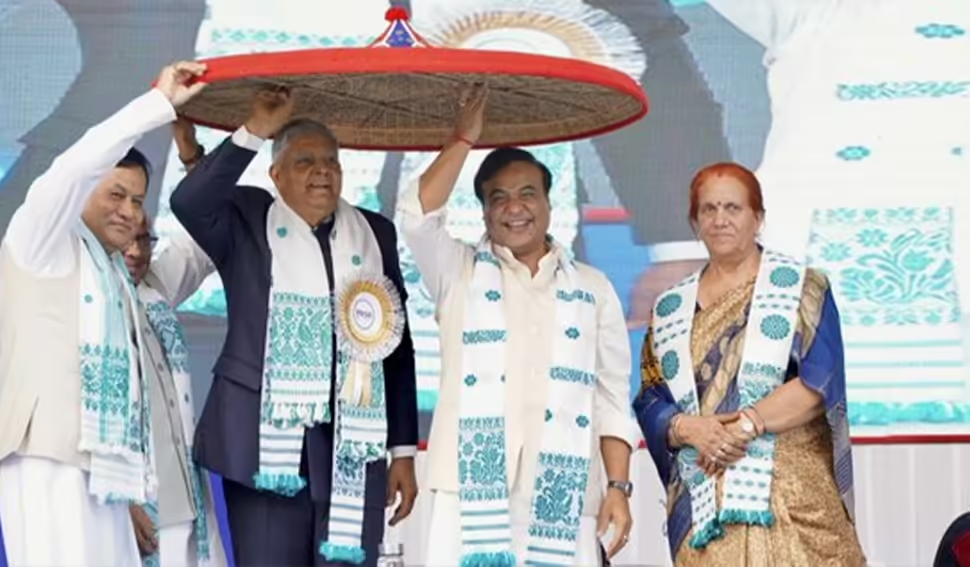Northeast is now centre stage in our national story, stresses VP Dhankhar

Vice-President Jagdeep Dhankhar highlighted the growing importance of the Northeast in India’s national development, describing it as “centre stage in our national story.”
Speaking at the 21st International Conclave of the Krishnaguru International Spiritual Youth Society in Guwahati, Dhankhar emphasized the Northeast’s transformational journey, calling it a phase of Purvodaya that few had previously imagined.
He pointed to the region’s rising prominence as a sign of India’s commitment to inclusivity, noting that the Northeast, once challenged by issues of development and connectivity, is now a top national priority. Dhankhar encouraged attendees to uphold three guiding principles as part of India’s transformation: spirituality, nationalism, and modernization through technology.
The Vice-President reflected on Krishnaguruji’s teachings, emphasizing that spirituality should remain central to their lives. Dhankhar added that combining spirituality, nationalism, and modernity would empower India to reclaim its status as Vishwaguru – a global leader and economic powerhouse – with this vision resting in the hands of the youth.
Dhankhar commended the profound influence of Krishnaguruji’s teachings. He described Krishnaguruji as a beacon of “divine grace” whose teachings of love, service, and humanity inspire followers to think beyond individual interests and prioritize the well-being of the community and the nation.
Dhankhar emphasized India’s deep-rooted spiritual heritage, noting how the country is home to numerous centers of spirituality, each contributing to its legacy of compassion, unity, and welfare. He underscored the essential qualities of spirituality – love, compassion, patience, tolerance, forgiveness, and responsibility – as foundations for building a peaceful and just society.
Reflecting on India’s history of resilience, Dhankhar highlighted the country’s tradition of selfless service, especially during times of crisis. He noted that India’s temples and spiritual centers have consistently provided aid, as seen during the COVID-19 pandemic and natural disasters, which he attributed to the guidance of India’s spiritual and historical texts. He cited the Ramayana, Mahabharata, Bhagavad Gita, Upanishads, and Vedas as sources of wisdom that encourage individuals to act for the greater good.
Dhankhar also touched on India’s evolving foreign policy toward the East, crediting Prime Minister Narendra Modi for expanding the Look East policy into the more dynamic Look East-Act East approach. This shift has strengthened India’s ties with Southeast Asia, positioning the Northeast region as a strategic and economic hub. The Vice-President emphasized that this policy has amplified the significance of Northeast India, fostering closer regional connections and enhancing its role in India’s engagement with Southeast Asia.
The Vice-President highlighted the transformative impact of the Look East-Act East policy on Northeast India, stating that this policy has elevated the region as a “place of opportunity” by fostering closer ties with Southeast Asian nations. He acknowledged the policy’s role in bringing economic vitality and strategic importance to the Northeast, positioning it as a vibrant, thriving region within India’s broader development narrative.
Dhankhar also celebrated the growing recognition of the Northeast’s unique cultural identity, recently marked by the recognition of Assamese as a classical language alongside Bengali, Marathi, Pali, and Prakrit. He described this milestone as a vital step in promoting Assam’s cultural richness and linguistic heritage, allowing Assam to extend its influence across the country.
The vice president emphasized the Northeast’s natural beauty and peaceful atmosphere, which he described as ideal for spiritual reflection and a deeper understanding of life’s interconnectedness. Dhankhar concluded by sharing substantial investment figures, noting that over the past decade, the central government has invested Rs 3.37 lakh crore in the Northeast. This investment, he explained, is not merely monetary but represents significant improvements in infrastructure, including roads, railways, and airports, thereby enhancing connectivity and growth in the region.
Assam Governor Lakshman Prasad Acharya, Chief Minister Himanta Biswa Sarma, Union Minister Sarbananda Sonowal, Bodoland Territorial Council (BTC) chief Pramod Boro, Bhaktimatri Kuntala Patowari Gowsami, Krishnaguru International Spiritual Youth Society president Kamala Gogoi were also present on the occasion.

Leave a Reply